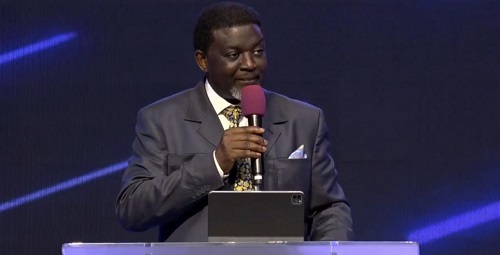
Ghana is a glass house: We are all throwing stones
I fully agree with Bishop Agyinasare's call shared in a video on social media, that all public servants who fleece the people by extortion, enrich themselves through kickbacks, inflate contract amounts, or loot state coffers directly, must "vomit the loot".
I find it rather interesting, though, that the Bishop has suddenly discovered some relevant scriptures against corruption, which he did not use to hold his political friends accountable, when they lost the elections in 2016.
But I digress. Corruption by public servants since we gained independence, has deprived Ghana of incalculable sums, while the many culprits have enriched themselves at the expense of the State.
And all this, is in addition to the widespread corruption in the private sector also, from unethical banking practices, merchants trading with fake measures, fraudulent land sales, to widespread tax evasion, and a very shady forex Black market, etc.
Over the decades, one has written various articles on the subject, and this remains a matter of public record. Corruption is indeed a canker in our society, and when members of our corrupt society become politicians, they merely continue the practice at that new level.
So it is always a good call for ill-gotten gains to be returned to the State. However, since June 1979, the call to "vomit the loot" has only come from the surrogates of brand new regimes, in reference to their ousted political opponents. Fact.
One wonders if Bishop Agyinasare's call to "vomit the loot" includes his political friends Mr. Mahama and Co., authoritatively described by their own party Founder JJ Rawlings, as "the most corrupt government in Ghana".
By the same token, one also wonders if this extends to the thousands of corrupt public servants, like Customs staff, who were described by President Mills as _"the worst and most corrupt in the Civil Service."
As is often the case in Ghanaian politics, President Mahama's "Operation Recover All Loot" is pregnant with irony, as his political party is also perceived to be equally guilty.
Already, some members of that taskforce are being accused publicly, of being corrupt themselves, with unexplained personal riches.
This is without prejudice to the stench of corruption also associated with certain members of the Akufo-Addo regime. There have even been a couple of resignations linked to corruption. Fact.
Alas, in our local party politics, there is none righteous. No, NOT one. ALL have sinned. On BOTH sides.
For this reason, there has been a palpable lack of political will to *really address, prevent, and punish* corruption in this country, especially during the Fourth Republic.
Even JJ Rawlings, under whose two 'revolutionary' regimes many were executed, murdered, prosecuted, or imprisoned for corruption, was himself accused of being "corrupt and a hypocrite" by his own party, the NDC.
Truly, there's none righteous. So while we agree that ALL our corrupt politicians and civil servants (who outnumber the politicians) must "vomit the loot", the million dollar question is: How far back in time, are we prepared to go, if we're truly HONEST?
If we're truly serious about dealing with corruption, this is not the time to politicize the issue, as corruption in its various forms, has been pervasive in Ghanaian society since independence. Fact.
Viewing corruption through our various political lenses, only helps to entrench the practice, as political patronage and nepotism will keep shielding the guilty in every reigning government.
Therefore, I repeat the same question I posed in 1994: How far back in time are we prepared to go, if we are truly HONEST about punishing corruption in Ghana?
Or, is this just the usual periodic call for the prosecution of our political foes on the other side, while we turn a blind eye to the blatant corruption by our own preferred bunch of political pickpockets?
